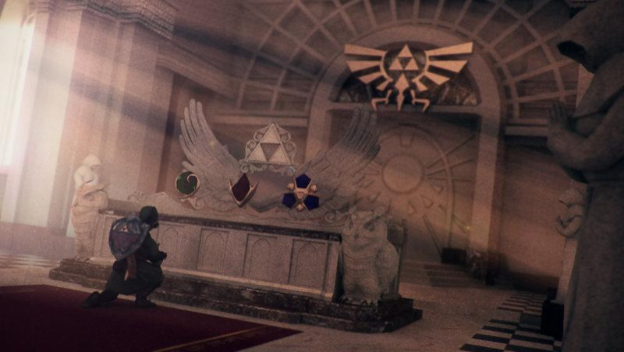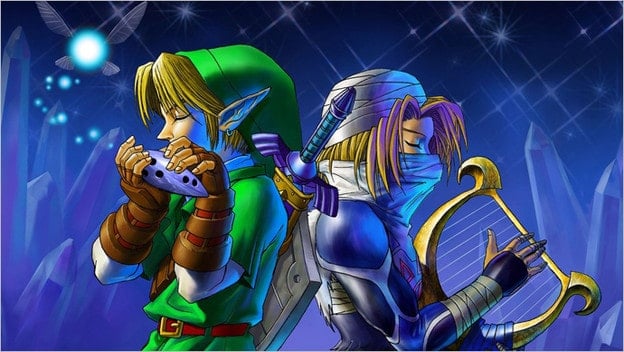Hey! Listen!
Memorable music in video games begins with Nintendo’s The Legend of Zelda . That was a game that revolutionized two-tone music into something so good, the grand orchestra of Skyward Sword could only build around it. But game music shouldn’t end with the Zelda series. There are plenty of games, like Skyrim and Dragon Age , that could benefit from similarly memorable music.
Memorable game music is not restricted to Zelda , of course. Okami came out the same year as Twilight Princess and has music to equal the Zelda series. Despite being very traditional Japanese music, Okami’s soundtrack won Best Score at the 2007 BAFTA Video Games Awards. In addition, Okami’s soundtrack appeals to a wide variety of gamers, even those who haven’t played the game. For a game’s music to stand on its own this way, apart from the game itself, is a huge achievement. This was my personal experience with Okami . My friend sent me “ Rising Sun ” without any real explanation at all, and I fell in love. I searched out more traditional Japanese music until I arrived at the game itself almost a year later.
Music takes on a similar importance for Okami and Zelda games as it does for films. It helps immerse the player in the game through emotion and essential sound cues. By immersion I mean both experiencing the game to its fullest, and emotional investment in the game. For example, in Ocarina of Time , during the initial unsealing of the Temple of Time, the awe and grandeur of the moment is captured perfectly in the music. Choirs reminiscent of Saint Benedict’s monks echo just like they would in a real cathedral. Or in Okami , nothing beats the music during the restoration of a guardian sapling. It’s filled with the uplifting chords of the harp, shamisen, and flute.
Sound cues also play a very important role, giving a signal to the player. Smaller ones include the scuttle of a Skulltula in Ocarina of Time , or the ascending shamisen notes when a task has been completed in Okami . More grand sounds cues are to do with setting the tone or atmosphere of a game. The foreboding Castle Town music, for example, during Link’s adulthood. The howling wind and heavily emphasized enemy music help add to the terror the player feels as they notice the ruined buildings and ReDeads in the Market place. Okmai’s music for Shinshu Field is also a very important sound cue. Not only does it denote safety, but a sense of looking forward to an exciting adventure. I don’t know about you, but nothing puts me in a brighter mood than the hopeful shamisen strings while wandering around in Shinshu Field.
Since music is so key to games like Okami and Zelda , it should definitely be in the forefront of other adventure games and RPGs. Skyrim and Dragon Age: Inquisition are more or less the adult versions of Zelda , including more complex worlds, characters, and themes. However, I feel that neither of these games can hold a candle to Zelda music, and they have more than two tones to play with at once. These games were developed with a more atmospheric, less melodic, musical philosophy. This philosophy falls short when it comes to giving the player emotional investment in moment-to-moment gameplay.

Nonetheless, music helps with the immersion and emotional connections to games. Though both Skyrim and Dragon Age have one or two extremely significant songs, they do not pervade the games quite the way Zelda or Okami does. Yes, “The Dawn Will Come” is the main theme of Dragon Age: Inquisition, but I certainly can’t think of any music that sounded like a theme in the other two DA games. Furthermore, with the grandeur of both games, it seems almost odd to hear the main theme song with every minor and major moment. “The Dawn Will Come” and Skyrim ‘s theme should not have been the only musically pivotal moment in the game. Both games could have been far more creative in this area.
Skyrim and Dragon Age could really use more and better music for sake of immersion and emotional impact. Loud and triumphant french horns would have fit the Hinterlands perfectly, motivating the player towards more quests, no matter how dull. Finding Woolsey the Ram would certainly have been more fun with a musical cue like “Ikana Valley” from Majora’s Mask playing. Or hunting down Shahvee’s Amulet would have felt far more serious if something like “Midna’s Lament” from Twilight Princess, was playing. Sound cues during conversations in both Skyrim and Dragon Age would have added a great deal more weight to the words said. The heavy piano notes of “Farewell Hyrule King” from The Wind Waker , while Merrill mourns Keeper Marethari, would have been all too appropriate. The notoriously emotionless opening of Skyrim might have stood a better chance of provoking an emotional response with “Death Mountain” from Twilight Princess was accompanying it.
It is clear that games like Skyrim and Dragon Age could only improve with more memorable music that invokes emotion in the player. Emotional music should not be limited to Japanese adventure games like Zelda and Okami . Other games definitely have the story and potential for such music, and I would love to see more Western developers pick up this style of soundtrack development, making their quests feels more like stories that matter.
